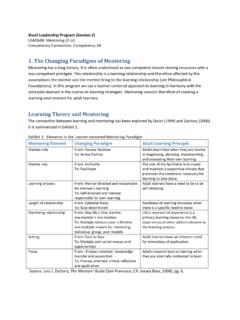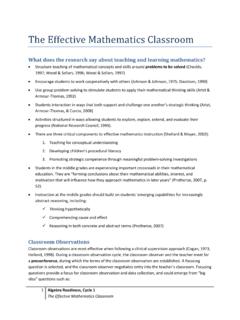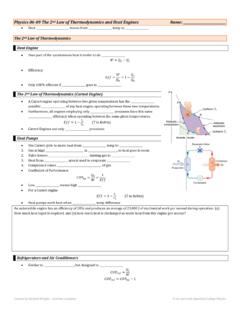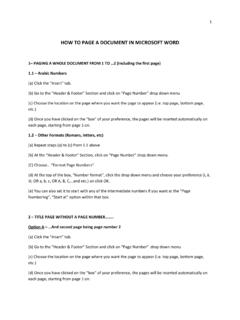Transcription of Ellen G. White and the SDA “Health Message:” God’s Third ...
1 Ellen G. White and the SDA Health Message: God s Third Priority for the First 20 Years of Vision Roger W. Coon Introduction: God s Apparent Priorities for Vision Content (1845-65): 1. Priority #1: Formulation of Doctrinal Framework--the Decade of the 1840s: a. The role of the Sabbath Conferences (1848-50) b. Dec. 13, 1850: We know that we have the truth. (Letter 30, 1850) 2. Priority #2: Organization of the SDA Denomination--the decade of the 1850s: a. Dec. 24, 1850: first vision on gospel order 11 days after EGW s declaration on doctrine. b. First three steps in organization taken in 1860: (i) May 13: First legally-organized SDA Church, Parkville, MI (ii) Oct.
2 1: SDA name adopted (iii) Oct. 1: First institution (publishing house) organized. 3. Priority #3: Development of the Health message --the Decade of the 1860s: a. The General Conference was organized May 21, 1863. Sixteen days later the first major health reform vision was given June 6th. (i) Autumn of 1848: The first known vision dealing with health-related matters (ii) Feb. 12, 1854: A second limited view given (iii) Friday night, June 6, 1863: The first major, comprehensive health vision given at Otsego, MI, in the home of Aaron Hilliard during a family worship period.
3 B. Christmas Day, 1865: The second major health vision was given in Rochester, NY. I. EGW s Health/Lifestyle Message Summarized: A. There is a significant link between the physical condition and spiritual experience: 1. God intends our bodies to be spiritual temples for the indwelling of His Holy Spirit. a. God owns these buildings by right both of original creation and of redemption, at great personal cost to heaven. b. He cares deeply how they are treated. 2. As the Owner, God has every right to decide how His personal property is treated. a. As a tenant, man has no right to do as he pleases with someone else s property. EGW referred to this wonderful house the Lord has given us.
4 (Letter 85, 1888; in 7MR 224) b. We have a sacred obligation to maintain these dwellings in an optimum condition. c. Men and women are to honor and glorify God in their bodies. d. We must not, therefore, defile them. e. God will punish severely all who thus desecrate their body temples. 3. Man was originally created in the image of God. a. Subsequently, this image was marred for the entire human race because of Adam & Eve s sin. b. The goal of the christian religion is redemption --restoration to the original state. B. The body, with the mind and its central nervous system, is the only medium through which God can communicate with human beings (MH 130). This may be the most important concept of the whole health/lifestyle message.
5 1. This explains Satan s concerted efforts to pollute, defile, and destroy both. 2. That is why we humans have a sacred duty to prevent this from happening. C. In the act of obeying health principles, the christian earns nothing toward his salvation and eternal life. (4 SGa: 148, 149) 1. The laws of health are not placed by God at the same level as the Ten Commandments. 2. God gave them not as an arbitrary exercise to show man who is boss; rather, being able to foresee the end results of undesirable practices, He knew we could be healthier and happier if we avoided the harmful and clung to the good. God requires obedience, not for the purpose of showing His authority, but that we may become one with Him in character.
6 (UL 347: 4) 3. Christians observe true health principles, not in order to be saved, but because they have been saved, and they are motivated by love to do God s expressed will for their lives. 4. A clear mind enables us to understand God s will; a strong body enables us to do it. (SDA Encyclopedia [1976]: 574) 5. But salvation itself is not a matter of eating and drinking. (Rom. 14:17) D. The christian , in every act of life, seeks to be guided by two great principles: 1. To promote and maintain life and good health: a. Preserve the best health. (CD 395) b. Eat that food which is most nourishing. (9T 163; CD 353) 2. Do the very best possible under every circumstance in which we find ourselves.
7 (IHP 60; MH 69, MR #1115 and 1409) E. The Body-Temple can be polluted, defiled, and ultimately destroyed through various bad habits: 1. Ingestion of deleterious food/drink/harmful substances 2. Insufficient physical exercise or a lack of the right kind of exercise. 3. Overwork--often coupled with insufficient rest/relaxation (1T 618): a. I know from the testimonies given me from time to time for brain workers, that sleep is worth far more before than after midnight. Two hours good sleep before twelve o clock is worth more than four hours after twelve o clock. (Letter 85, May 10, 1888; cited in 7MR 224) b. Physical, as well as mental, workers should take a much longer time to eat than they generally allow; then one hour spent after eating, upon matters which are of little more consequence than to interest or amuse, before they subject themselves to hard labor again.
8 (Ibid.; cited in 7MR 225) 4. Feeding the mind upon impure thoughts ( Whatsoever things are true, honest, just, pure, lovely, of good report .. Phil. 4:8) 5. Improper posture 6. Abuse of body organs by: a. Overeating or eating too rapidly b. Irregularity in meal times c. Snacking between regular meals d. Overexertion, straining, or constriction 7. Failure to employ natural remedies in sufficient amount F. Authentic Christians will strive for mastery and true temperance : 1. Judicious moderation in the use of all that is good and health-producing 2. Total abstinence from all that harms and hurts (PP 562) G.
9 God s people have a twofold obligation to themselves and the world: 1. The establishment of health care centers for healing those afflicted with illness and disease 2. Propagation of preventive methods and practices by which these may be avoided altogether (1T 489; Ms 1, 1863, p. 6) H. Whenever possible, in attempting to effect physical healing, natural remedies (including trust in divine power--see 5T 443; MH 127) are the preferred therapeutic agencies: 1. Poisonous drugs/substances should be avoided whenever/wherever possible. 2. However, there is a legitimate place for some drugs like anesthetics & immunizations and prophylaxis.
10 (2SM 279-84) I. The original Edenic diet of fruits, nuts, grains, and vegetables is yet today the preferred diet of those seeking to develop optimum physical health and spiritual growth and well-being: 1. Meat, poultry, and fish, as well as certain dairy and poultry products, are increasingly undesirable and unsafe for a. Physiological reasons: (i) Disease in the animals/fish themselves (ii) Possible chemical/radioactive contamination b.









